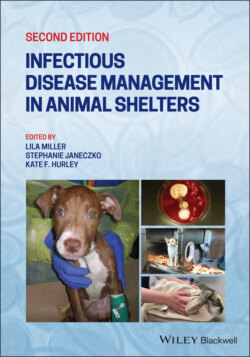Читать книгу Infectious Disease Management in Animal Shelters - Группа авторов - Страница 58
2.5.8 Individual‐Specific Care
ОглавлениеWellness protocols may also be dictated by the specific needs of individual animals. In some cases, the needs of individuals may be anticipated based on particular physical or behavioral traits, or breed, if known, since many breed predispositions have been well documented. For example, caution must be taken with brachycephalic dogs to ensure they do not experience heat exhaustion, to which they are extremely sensitive given the conformation of their airways. This may affect the selection of holding/housing areas and exercise routines for these individuals. Poor airway conformation also predisposes brachycephalic dogs and cats to more severe URIs than other breeds. For these reasons, care should be taken to house brachycephalic animals in well‐ventilated areas away from sick animals, and they should be prioritized for removal to foster care or rescue. In the author's experience, even intranasal vaccination of these breeds is best avoided because it can result in severe clinical signs of respiratory disease.
Similarly, certain other breeds require special care in the shelter depending on their medical or behavioral genetic predispositions. The pit bull is another example: Many of these dogs require extra attention regarding housing conditions in a kennel setting so that a propensity to learn or exhibit dog‐dog aggression is not exacerbated through exposure to high levels of arousal and stimulation from other dogs. This type of behavior may be exhibited by other breeds and individual dogs as well and similar precautions should be taken regarding their care and housing.
